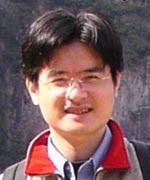|
|
 |
 |

Elizabeth Bishop (1911-1979)
伊莉莎白-毕肖普
  Elizabeth Bishop born in Worcester, Massachusetts in 1911, was considered by many critics as "one of the most important American poets" of the twentieth century. She taught poetry at Harvard and New York University. Bishop was Consultant in Poetry to the Library of Congress in 1949-50. In 1955, she received the Pulitzer Prize for Poems: North & South — A Cold Spring. Her book of poetry Questions of Travel, won the National Book Award in 1965. A later book, Geography III, received the National Book Critics Circle Award in 1976. Elizabeth Bishop born in Worcester, Massachusetts in 1911, was considered by many critics as "one of the most important American poets" of the twentieth century. She taught poetry at Harvard and New York University. Bishop was Consultant in Poetry to the Library of Congress in 1949-50. In 1955, she received the Pulitzer Prize for Poems: North & South — A Cold Spring. Her book of poetry Questions of Travel, won the National Book Award in 1965. A later book, Geography III, received the National Book Critics Circle Award in 1976.
伊莉莎白-毕肖普(1911-1979)是美国20世纪最重要的诗人之一。1911年生于美国马萨诸塞州的伍斯特。曾任教于哈佛和纽约大学。1949-1950年成为美国国会图书馆诗歌顾问。伊丽莎白-毕肖普凭诗集《北与南》(1946)和另一部新诗集《一个寒冷的春天》合编为《诗集》(1955),获得普利策奖。诗集《旅行的问题》(1965)获国家图书奖。另一部诗集《地理学III》(1976)获国家书评界奖。
|

|

译者
Translator
戴玨
Edgar Dive
 
戴玨毕业于伦敦经济学院和澳洲国立大学。其诗作曾发表于《乾坤诗刊》《诗选刊》等。现居于香港。
Born in 1972, Dive graduated from The London School of Economics and The Australian National University. He has published poems and translations in literary journals including Chien Kun Poetry Quarterly and Poetry Selected. He lives in Hong Kong.
|
 |
Filling Station |
 |
加油站 |
Oh, but it is dirty!
—this little filling station,
oil-soaked, oil-permeated
to a disturbing, over-all
black translucency.
Be careful with that match!
Father wears a dirty,
oil-soaked monkey suit
that cuts him under the arms,
and several quick and saucy
and greasy sons assist him
(it's a family filling station),
all quite thoroughly dirty.
Do they live in the station?
It has a cement porch
behind the pumps, and on it
a set of crushed and grease-
impregnated wickerwork;
on the wicker sofa
a dirty dog, quite comfy.
Some comic books provide
the only note of color—
of certain color. They lie
upon a big dim doily
draping a taboret
(part of the set), beside
a big hirsute begonia.
Why the extraneous plant?
Why the taboret?
Why, oh why, the doily?
(Embroidered in daisy stitch
with marguerites, I think,
and heavy with gray crochet.)
Somebody embroidered the doily.
Somebody waters the plant,
or oils it, maybe. Somebody
arranges the rows of cans
so that they softly say:
ESSO—SO—SO—SO
to high-strung automobiles.
Somebody loves us all.
|
|
哎,可真脏啊!
——这小小的加油站,
给油污浸透,渗遍了,
整个一片令人不安,
发黑的半透明。
小心那火柴!
父亲穿着一件肮脏
油腻,箍着腋窝
的短制服,
有几个手脚快而鲁莽的
油腻儿子协助他
(这是个家族加油站),
每一位都完全彻底地脏。
他们就住在加油站吧?
这里有水泥门廊,
就在油泵后面,而廊上
有一组起了皱,充满了
油污的藤制家具;
在藤沙发上
有只脏狗,怪舒服的。
几本连环漫画书
提供了仅有的色调 —
某种色调。它们摆在
一块盖着张小凳子
(那一组的一分子)
的暗色大垫布上面,挨着
一盆毛茸茸,硕大的秋海棠。
为什么会有不相关的植物?
为什么会有小凳子?
为什么,啊,为什么,会有垫布?
(用雏菊针法绣上了
我想是雏菊花吧,
而且有很多灰色钩编。)
有人给垫布绣了花。
有人为花浇了水,
或许是上了油。有人
布置了那一排排的罐子
这样它们便对着
紧张的车辆轻轻地说:
埃索—索—索—索
有人爱我们每一个。
注:埃索:指埃索石油公司。
|
 |
One Art |
 |
一种艺术 |
The art of losing isn’t hard to master;
so many things seem filled with the intent
to be lost that their loss is no disaster.
Lose something every day. Accept the fluster
of lost door keys, the hour badly spent.
The art of losing isn’t hard to master.
Then practice losing farther, losing faster:
places, and names, and where it was you meant
to travel. None of these will bring disaster.
I lost my mother’s watch. And look! my last, or
next-to-last, of three loved houses went.
The art of losing isn’t hard to master.
I lost two cities, lovely ones. And, vaster,
some realms I owned, two rivers, a continent.
I miss them, but it wasn’t a disaster.
—Even losing you (the joking voice, a gesture
I love) I shan’t have lied. It’s evident
the art of losing’s not too hard to master
though it may look like (Write it!) like disaster.
(Note: These poems are selected from Complete Poems
by Elizabeth Bishop (Chatto and Windus 2004).
|
|
失去这种艺术并不难掌握;
这么多事物似乎充满被丢失的意图,
那失去它们也就不算灾祸。
每天都弄丢东西。接受失落
大门钥匙的狼狈,虚度
的小时。失去这种艺术并不难掌握。
那么来练习更远、更快的失落:
地方,名字,还有是打算去何处
旅游的呢。这些都不会带来灾祸。
我弄丢了母亲的表。你瞧!我住过
三栋心爱的房子,最后或之前的那栋已去。
失去这种艺术并不难掌握。
我失去了两座城,可爱的城,而且,更辽阔
的地域我也曾拥有,两条河流,一整块大陆。
我想念它们,但那也并不算灾祸。
——甚至失去你(开玩笑的声音,我爱做
的一种手势)我可不说瞎话。很清楚,
失去这种艺术并非太难掌握,
尽管它可能看起来(写 下来!)像灾祸。
注:以上诗作译自伊丽莎白-毕肖普的《诗全集》
(查托温德斯出版社,2004)
|
|
|







